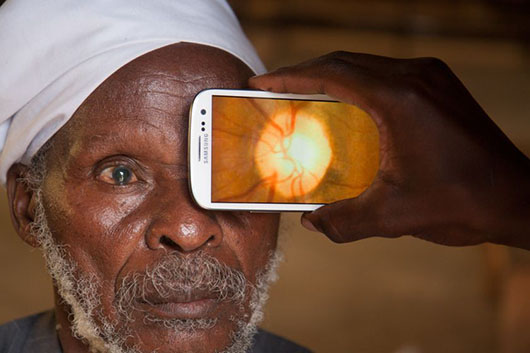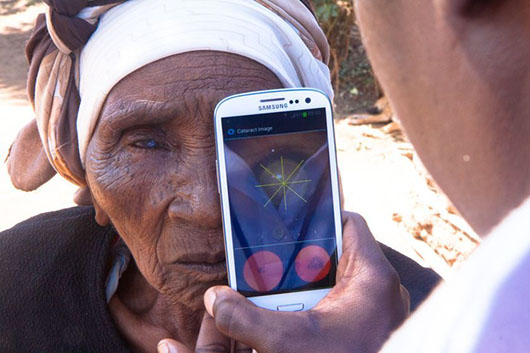‘Eye-phone’ that could help prevent blindness

A man from Nakuru, Kenya, having his retina imaged for optic nerve diseases by the Peek smartphone tool. Credit: Peek.
Visionary scientists have developed an adapted smartphone that can carry out eye tests and diagnose problems with vision.
The portable eye examination kit, created by scientists at the University of St Andrews, the London School of Hygiene & Tropical Medicine and NHS Greater Glasgow and Clyde, is currently being tested in Kenya as a potential tool to revolutionise the prevention of blindness in low-income countries.
Also known as Peek, the kit consists of a mobile app and clip-on hardware that transforms a smartphone into a tool that can check glasses prescription, diagnose cataracts and even examine the back of the eye for disease.
285 million people worldwide are visually impaired and 39 million of these people are blind – 90% of these blind people live in low-income countries where there is little or no access to ophthalmologists. Currently, to carry out a full range of ophthalmic diagnostic tests, a team of 15 trained personnel are needed to operate state-of-the-art hospital equipment costing more than £100,000.
However, just one non-expert with minimal training can use Peek to gather detailed clinical information on a low-cost Android smartphone with a simple clip on attachment.
Peek has been developed by Dr Andrew Bastawrous (London School of Hygiene & Tropical Medicine), Stewart Jordan, an independent app designer, Dr Mario Giardini (University of St Andrews) and Dr Iain Livingstone, at the Glasgow Centre for Ophthalmic Research, NHS Greater Glasgow and Clyde. Dr Jen Burr at St Andrews was instrumental in setting up the links that allowed the University to take part in the development of the device.
It is currently being tested on 5,000 people in Kenya by Dr Bastawrous to see how effective it is in comparison to state-of-the-art hospital equipment.
Dr Bastawrous said: “Patients who need it most will never be able to reach hospital because they’re the ones beyond the end of the road, they don’t have income to find transport so we needed a way to find them.
“What we hope is that Peek will provide eye care for those who are the poorest of the poor. A lot of the hospitals are able to provide cataract surgery which is the most common cause of blindness, but actually getting the patient to the hospitals is the problem.
“What we can do using this is the technicians can go to the patients to their homes, examine them at their front doors and diagnose them there and then.”
Peek can diagnose blindness, visual impairment, cataracts, glaucoma, macular degeneration, diabetic retinopathy and other retinal and optic nerve diseases and crucial indicators of brain tumour and haemorrhage. The system stores contact information and GPS data for each patient. Google-map integration allows a novel way to follow-up and treat patients. More broadly, such technology allows co-ordination of services, to target mass treatment campaigns to the regions of greatest need.
The Peek tool has already been described as ‘potentially a huge game changer’ by the International Agency for the Prevention of Blindness.
Peek is also being tested in Antarctica, where an expedition team originally led by Sir Ranulph Fiennes are assessing whether their eyes and vision change with the prolonged exposure to cold and darkness. As the conditions are considered a surrogate to life in space, the data will provide valuable information for space programmes.
Funders include the British Council for the Prevention of Blindness, Medical Research Council, Fight for Sight and the International Glaucoma Association.

A woman from Nakuru, Kenya, having a cataract scan with the Peek smartphone tool. Credit: Peek.
ENDS
Note to editors
Dr Mario Giardini is available for interview on: 07511 032515.
Watch a demonstration of the Peek kit
Category Research